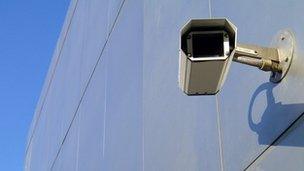Surveillance camera code of practice comes into force
- Published
- comments

The code applies to the CCTV and automatic number plate recognition systems of public bodies
A code of practice on the use of surveillance cameras by bodies such as local authorities and police forces has come into effect in England and Wales.
The Home Office introduced the code, external after concerns over the potential for the abuse or misuse of surveillance by the state in public places.
The code says the cameras must be used "in pursuit of a legitimate aim" and when it "meets a pressing need".
Campaign group Big Brother Watch said the code did not go far enough.
The code of practice also restricts access to and retention of data, and encourages private operators to apply the code as well as public bodies.
The code says: "Where used appropriately, these systems are valuable tools which contribute to public safety and security and in protecting both people and property.
"The purpose of the code will be to ensure that individuals and wider communities have confidence that surveillance cameras are deployed to protect and support them, rather than spy on them."
The code of practice has been introduced under the Protection of Freedoms Act 2012, external, which also established the post of surveillance camera commissioner.
The 12 point code of conduct says, external the use of a surveillance camera system must:
always be for a specified purpose which is in pursuit of a legitimate aim and necessary to meet an identified pressing need
take into account its effect on individuals and their privacy
have as much transparency as possible, including a published contact point for access to information and complaints
have clear responsibility and accountability for all surveillance activities including images and information collected, held and used
have clear rules, policies and procedures in place and these must be communicated to all who need to comply with them
have no more images and information stored than that which is strictly required
restrict access to retained images and information with clear rules on who can gain access
consider any approved operational, technical and competency standards relevant to a system and its purpose and work to meet and maintain those standards
be subject to appropriate security measures to safeguard against unauthorised access and use
have effective review and audit mechanisms to ensure legal requirements, policies and standards are complied with
be used in the most effective way to support public safety and law enforcement with the aim of processing images and information of evidential value, when used in pursuit of a legitimate aim
be accurate and kept up to date when any information is used to support a surveillance camera system which compares against a reference database for matching purposes
The role of the commissioner, Andrew Rennison, is to encourage compliance, review how the code is working and recommend any changes.
The code applies to CCTV and automatic number plate recognition systems.
Minister for Criminal Information Lord Taylor of Holbeach said CCTV and number plate recognition were "vital tools" but it was "crucial they focused on aiding the fight against crime and protecting the public".
The code and the commissioner's work "will better harness these technologies and help put an end to CCTV systems growing without proper oversight," he added.
'Surveillance state'
In 2010, West Midlands Police apologised after 200 so-called spy cameras were set up in largely Muslim areas of Birmingham.
The cameras, some of them hidden, were paid for with £3m of government funding intended for tackling terrorism.
Residents were angry about a lack of consultation and an independent report was highly critical. The police said none of the cameras had been switched on.
That scandal prompted the government to launch a consultation on the introduction of the code of practice and the commissioner.
Nick Pickles, director of Big Brother Watch, said the the code was a step in the right direction but more needed to happen.
He said: "With only a small fraction of cameras covered and without any penalties for breaking the code there is much more that could be done to protect people's privacy from unjustified or excessive surveillance.
"Ultimately the regulator needs real powers to enforce the rules and the code should apply to every CCTV camera, irrespective of who is operating it.
Mr Pickles added: "We have already seen cases of cameras in school toilets, neighbours involving the police because of cameras on private property and concerns about new marketing technology tracking number plates, yet the code would not apply in any of these situations.
"As CCTV technology improves and issues like facial recognition analysis come to the fore it is essential that people are able to access meaningful redress where their privacy is infringed.
"The surveillance camera commissioner must be given the powers and the resources to take action, otherwise the public will rightly ask if the surveillance state continues to escape accountability."
- Published24 July 2013
- Published15 June 2013
- Published24 May 2013
- Published1 March 2011